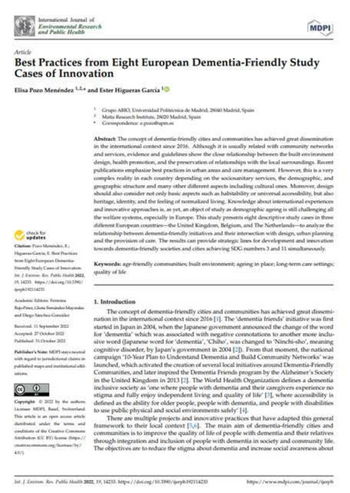Best practices from eight innovative European projects on dementia friendliness and dementia

Journal of Environmental Research and Public Health 19, no. 21: 14233
The concept of dementia-friendly cities and communities has gained wide currency in the international context since 2016. Although often related to community networks and services, evidence and guidelines show the close relationship between the design of the built environment, health promotion and the preservation of relationships with the local environment. Recent publications emphasise best practice in urban areas and care management. However, this is a very complex reality in each country depending on health and social services, demographic structure, geography and many other different aspects, including cultural ones. Moreover, design must also consider not only basic aspects such as liveability or universal accessibility, but also heritage, identity and a sense of normalised living.
Knowledge about international experiences and innovative approaches is, so far, an object of study as demographic ageing continues to challenge all welfare systems, especially in Europe.
This study presents eight descriptive case studies in three different European countries, the UK, Belgium and the Netherlands, to analyse the relationship between dementia-friendly initiatives and their intersection with design, urban planning and care provision. The results can provide strategic directions for development and innovation towards dementia-friendly societies and cities that achieve SDGs 3 and 11 simultaneously.

